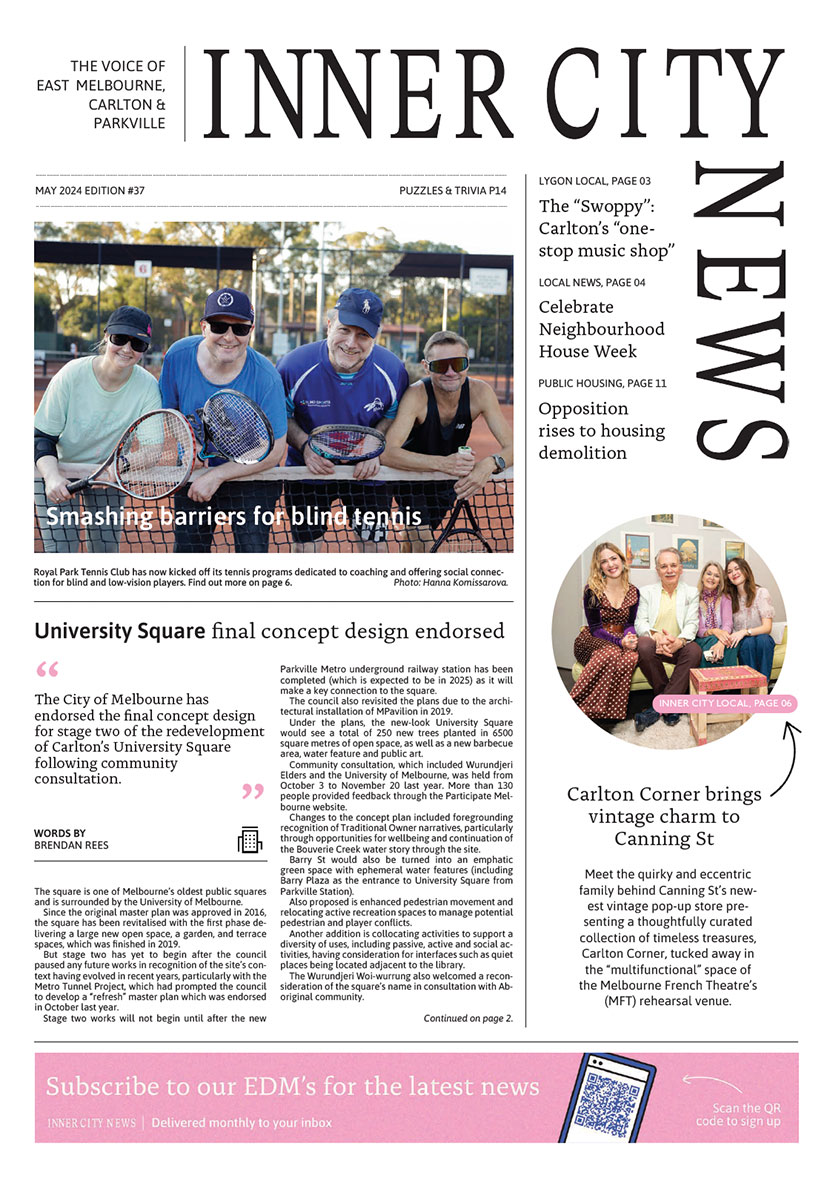Is Lygon St still Melbourne’s “Little Italy”?
From chariot races to the greasy pole competition – the Lygon Street Festa of the ‘80s was a grandiose celebration of Italian Carlton that brought people in from far and wide.
Attracting more than 700,000 people at its peak, the Festa shut down the entirety of Lygon, Elgin and Queensberry streets for the weekend to let the masses through.
But fast-forward to 2021 and the Festa is a far-cry from what it used to be.
On April 18, the now-called Italia Festa was a small affair confined to Argyle Square with a handful of food trucks bombarded by long lines of people.
While there was a stage with live music, classic Italian cars and cooking classes, the Festa has become tamer since its inception in 1978.
Frank DiMattina, who has owned businesses on Lygon St since the ‘80s, said that due to the lack of resources and people losing interest, the Festa hadn’t been the same for the past 15 years.
“In the old days, the Festa was amazing – there were chariot races down Lygon St, the waiter’s race, the greasy pole competition and walls of people walking the streets,” Mr DiMattina said.
“But it hasn’t been like that for some time.”
With a cultural evolution happening under Carlton’s surface, the downfall of the Festa has been a long time coming.
Due to low levels of Italian migrants in recent decades, the 2016 census revealed there were only 60,000 Italians in Melbourne compared to nearly 90,000 in 1996. In Carlton, there are now only 254 Italian-born residents.
Mr DiMattina said that the suburb had been undergoing a cultural shift for decades now.
“Lygon St is changing all the time, it’s not like Little Italy anymore,” Mr DiMattina said.
“New businesses are opening up – Indian, Pakistani, Chinese – so it’s a different feel.”
Lygon St has been constantly evolving since European migrants began arriving during the gold rush era.
Before the Italians moved in post-World War II, Lygon St used to be the Jewish precinct of Melbourne.
The Yiddish-speaking street boasted tenants such as Altshuler’s Jewish Book Shop, Berenholz’s shoe repair, the Markov pharmacy and Kanatopsky grocery.
Although there are still many Jewish landlords on Lygon St, in the late ‘40s, the Italians settled in and the Jews moved down to the Balaclava area.
Carlton Community History Group president Jeff Atkinson said it was a “misconception” that there had been a turf war between the Italians and the Jews, and the shift had been a natural one.
“Lygon St has always been a refuge for new migrants, particularly young men, while they came together and found their feet,” Mr Atkinson said.
“After the Second World War there was a flood of Italian migrants as large numbers of immigrants from all over Italy, fleeing a Europe devastated by years of war, came here in search of a new life of peace and prosperity.”
“So, Lygon St slowly took on the character of an Italian village with Italian-owned grocery and fruit shops, barbers, bakeries, patisserie shops, cafes and restaurants.”
Between 1945 and 1981, some 400,000 Italians migrated to Australia, 40 per cent of them to Victoria, and a significant proportion of those to the Carlton area.
By 1960, it’s been estimated there were some 7000 people of Italian origin living in Carlton, making up more than 25 per cent of the area’s population.
Mr Atkinson said that since then, Italian migration had dwindled, and new migrants were driving another cultural shift.
“While much of Carlton has become gentrified, cheap high-rise accommodation has ensured that the suburb still attracts newly arrived migrants who these days come from Africa, Asia and the Middle East,” Mr Atkinson said.
“Lygon St has been adopted by the whole of Melbourne.”
Casa Del Gelato owner Eric Pace, whose mother Joanna Pace started up the original Lygon Street Festa in 1978, has seen that shift first hand.
“There’s not many of the original family-owned Italian businesses left on the street,” Mr Pace said. “You can see how many vacant shops there are now, but that was happening even before COVID hit.”
With a vacancy rate of 28 per cent at the end of 2020, Carlton has lost many Italian business icons like Grinders Coffee which had been on Lygon St since 1962.
But from the ashes new businesses are starting to pop up – including an Afghani restaurant near Argyle Square.
Although Lygon St was changing, Mr Dimattina said that it was important to appreciate memories for what they were and to go with the flow.
“I have unbelievable memories of Lygon St and the Festa, there was so many people in the streets you could barely walk through it,” Mr Dimattina said. “But like everything, with time, it changes.” •

University Square final concept design endorsed






 Download the Latest Edition
Download the Latest Edition